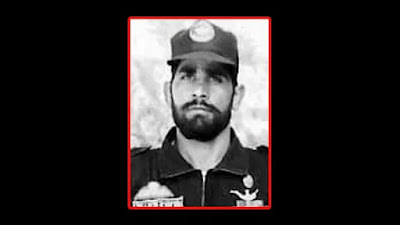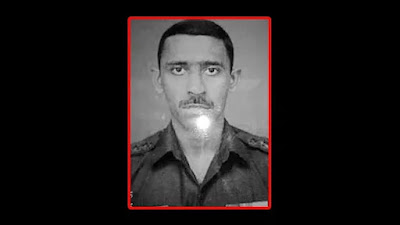कारगिल विजय दिवस स्वतंत्र भारत के सभी देशवासियों के लिए एक बहुत ही महत्वपूर्ण दिवस है। भारत में प्रत्येक वर्ष 26 जुलाई को यह दिवस मनाया जाता है। इस दिन भारत और पाकिस्तान की सेनाओं के बीच वर्ष 1999 में कारगिल युद्ध हुआ था जो लगभग 60 दिनों तक चला और 26 जुलाई के दिन उसका अंत हुआ और इसमें भारत विजय हुआ। कारगिल विजय दिवस युद्ध में शहीद हुए भारतीय जवानों के सम्मान हेतु यह दिवस मनाया जाता है।
इतिहास
1971 के भारत-पाक युद्ध के बाद भी कई दिन सैन्य संघर्ष होता रहा। इतिहास के मुताबित दोनों देशों द्वारा परमाणु परीक्षण के कारण तनाव और बढ़ गया था। स्थिति को शांत करने के लिए दोनों देशों ने फरवरी 1999 में लाहौर में घोषणा पत्र पर हस्ताक्षर किए। जिसमें कश्मीर मुद्दे को द्विपक्षीय वार्ता द्वारा शांतिपूर्ण ढंग से हल करने का वादा किया गया था। लेकिन पाकिस्तान ने अपने सैनिकों और अर्ध-सैनिक बलों को छिपाकर नियंत्रण रेखा के पार भेजने लगा और इस घुसपैठ का नाम "ऑपरेशन बद्र" रखा था। इसका मुख्य उद्देश्य कश्मीर और लद्दाख के बीच की कड़ी को तोड़ना और भारतीय सेना को सियाचिन ग्लेशियर से हटाना था। पाकिस्तान यह भी मानता है कि इस क्षेत्र में किसी भी प्रकार के तनाव से कश्मीर मुद्दे को अंतरराष्ट्रीय मुद्दा बनाने में मदद मिलेगी।
प्रारम्भ में इसे घुसपैठ मान लिया था और दावा किया गया कि इन्हें कुछ ही दिनों में बाहर कर दिया जाएगा। लेकिन नियंत्रण रेखा में खोज के बाद और इन घुसपैठियों के नियोजित रणनीति में अंतर का पता चलने के बाद भारतीय सेना को अहसास हो गया कि हमले की योजना बहुत बड़े पैमाने पर किया गया है। इसके बाद भारत सरकार ने ऑपरेशन विजय नाम से 2,00,000 सैनिकों को भेजा। यह युद्ध आधिकारिक रूप से 26 जुलाई 1999 को समाप्त हुआ। इस युद्ध के दौरान 550 सैनिकों ने अपने जीवन का बलिदान दिया और 1400 के करीब घायल हुए थे ।
कारगिल युद्व (kargil war) से जुड़ी 10 बड़ी बातें
1. एक चरवाहे ने भारतीय सेना को कारगिल में पाकिस्तान सेना के घुसपैठ कर कब्जा जमा लेने की सूचना तीन मई 1999 को दी थी.
2. भारत ने एलओसी पर से पाक सैनिकों को खदेड़ने के लिए कारगिल सेक्टर में ऑपरेशन विजय (Operation Vijay) अभियान चलाया था.
3. 26 जुलाई को भारत ने कारगिल युद्ध (kargil war) में जीत हासिल की थी. कारगिल युद्व में भारतीय सेना ने पाकिस्तान के 3 हजार सैनिकों को मार गिराया था. यह युद्ध 18 हजार फीट की ऊंचाई पर लड़ा गया था.
4. करगिल युद्ध में भारत के 527 जवान शहीद हुए और 1363 जवान घायल हो हुए थे.
5. बोफोर्स तोपें कारगिल लड़ाई में सेना के खूब काम आई थी.
6. भारतीय सेना को कारगिल के युद्ध में बड़ी मुश्किलों का सामना करना पड़ा था. पाकिस्तानी सैनिक ऊंची पहाड़ियों पर बैठे थे और हमारे सैनिकों को गहरी खाई में रहकर उनसे मुकाबला करना था. भारतीय जवानों को आड़ लेकर या रात में चढ़ाई कर ऊपर पहुंचना पड़ रहा था जोकि बहुत जोखिमपूर्ण था.
7. भारतीय वायुसेना ने कारगिल युद्ध में बड़ा योगदान दिया था. भारतीय वायुसेना ने 32 हजार फीट की ऊंचाई से एयर पावर का उपयोग किया था. भारतीय वायुसेना ने पाकिस्तान के खिलाफ मिग-27 और मिग-29 का भी इस्तेमाल किया और जहां भी पाकिस्तान ने कब्जा किया था वहां बम गिराए गए. साथ ही पाकिस्तान के कई ठिकानों पर आर-77 मिसाइलों से हमला किया गया था.
8. कारगिल (kargil) युद्ध के समय अटल बिहारी वाजपेयी देश के प्रधानमंत्री थे.
9. कारगिल युद्ध की जीत की घोषणा तत्कालीन पीएम अटल बिहारी वाजेपयी ने 14 जुलाई को की थी, लेकिन आधिकारिक तौर पर 26 जुलाई को करगिल विजय दिवस (Kargil Vijay Diwas) की घोषणा की गई थी.
Here are the stories of 10 heroes of Kargil war victory:
Captain Vikram Batra, (13 JAK RIF)
Captain Vikram Batra of the 13 Jammu and Kashmir Rifle immortalised himself by turning a soft-drink ad's tagline "Yeh dil mange more" (My heart asks for more) into an iconic war cry while showcasing on national television the enemy's machine guns he had captured in his first gallant exploits in the Kargil war.
He died fighting Pakistani forces during the Kargil war in 1999 at the age of 24. He was given the highest wartime gallantry award Param Vir Chakra posthumously.
Due to his exemplary feat, Captain Vikram was awarded many titles. He came to be fondly called the 'Tiger of Drass', the 'Lion of Kargil', the 'Kargil Hero', and so on. Pakistanis called him Sher Shah after the ferocious warrior king of medieval India.
Lieutenant Balwan Singh (18 Grenadiers)
Lt Balwan Singh, now a Colonel, was the Tiger of Tiger Hill -- the decisive battle of the Kargil wara. Singh was tasked with the recapture of Tiger Hill.
At 25, he led soldiers of the Ghatak platoon through a steep, treacherous path on 12-hour journey to reach the hilltop. The assault took the enemy by surprise as India was not expected to take such a difficult route.
In the ensuing close combat, Lt Singh killed four enemy soldiers despite being serious injured. Rest of the Pakistani soldiers opted to flee than facing wrath of the brave Indian officer.
He planted the Indian tricolour atop the Tiger Hill and was later awarded the Mahavir Chakra for his bravery. Before setting off for the Tiger Hill, Lt Singh took a vow with his soldiers: "Tiger Hill pe Tiranga fahrake ayenge, chahe kuchh bhi ho jaye." ("We will hoist the Tricolour atop Tiger Hill, come what may.")
Grenadier Yogendra Singh Yadav (18 Grenadiers)
Then 19-years-old, Yogendra Singh Yadav (now Subedar Major) was the youngest person to ever be awarded the Param Vir Chakra.
He was the sole survivor of an attack on Tiger Hill in which he took 15 bullets. He was a part of the Ghatak platoon that recaptured three strategic bunkers on Tiger Hill on July 4, 1999.
Yadav led the assault but halfway through enemy lines opened fires, killing his colleagues. Yadav, was himself hit by several bullets which rendered his left arm immobile.
Determined to achieve his objective, Yadav strapped his arm in a belt, wrapped a bandana around his leg and continued to fight the enemy. He killed four enemy soldiers in close combat and silenced the automatic fire.
This gave the rest of his platoon the opportunity to climb up the cliff and capture the positions.
Major Rajesh Adhikari (18 Grenadiers)
On May 14, 1999, Major Rajesh Adhikari was leading the central arm of three 10-man teams trying to capture a bunker at 16,000 ft at the Tololing feature.
He displayed exemplary valour in recapturing Tololing, where he engaged in direct combat with the Pakistani soldiers guarding the bunkers.
Major Adhikari suffered serious bullet injuries to which he succumbed beyond enemy lines on May 15. He was the second army officer to be martyred in Kargil war.
His body was recovered 13 days later. In his pocket was an unread letter from his wife. He was posthumously awarded Mahavir Chakra for his bravery.
Major Vivek Gupta (2 RR)
Vivek Gupta of the 2 Rajputana Rifles was leading a dangerous uphill assault against the Pakistani intruders. He captured two bunkers before being enemy bullets tore open his torso in Drass.
The Major lay in the snow alongside dead colleagues for two days. He died fighting exactly seven years after being commissioned in the 2nd Rajputana Rifles - June 13, 1992.
Naik Digendra Kumar (2 RR)
Naik Digendra Kumar is best known for his plan to recapture Tololing that is located an altitude of 15,000 feet. His plan had surprised General VP Malik, the then army chief, who held a Sainik Darbar in Drass on June 2, 1990 after three failed attempts to get back Tololing.
His idea of following the same route as the enemy sounded too risky to the army chief. But Naik Digendra Kumar insisted and set off on the mission.
The team of 10 commandos came under heavy firing from 250 Pakistani soldiers. Nine commandos died. But before that they handed over their guns and grenades to Naik Digendra Kumar, who lodged them in all 11 bunkers of the enemy.
He killed Major Anwar Khan of Pakistan Army in hand-to-hand combat slitting enemy's throat with his dagger. He planted Indian flag on the hilltop before falling unconscious. He woke up in an army hospital.
Major Padmapani Acharya (2 Rajputana Rifles)
Major Padmapani Acharya was a company commander and assigned the task of recapturing an enemy position in Tololing. Bracing a hail of Pakistani shells and bullets, Major Acharya overran the enemy position.
He was grievously injured in the process and succumbed to his injuries soon after completing his mission. Days before the battle, he had written a letter to his father telling him "combat is an honour of a lifetime".
In the same letter, he requested his father to tell "a story a day from the Mahabharata" to his daughter Charu, who could never got to see her father again but at 20, she wishes to join the army.
Rifleman Sanjay Kumar (13 JAK Rif)
Rifleman Sanjay Kumar was once a taxi driver and had been rejected thrice by the army. Today, he is the youngest of three surviving Param Vir Chakra decorated soldiers of the Indian Army.
During the Kargil war, he was part of a column that was tasked to capture area Flat Top of Point 4875 in the Mushkoh Valley.
When automatic fire from one of the enemy bunkers posed stiff opposition and stalled the column, Kumar charged at them head on. He was hit in the leg and hip. But he single-handedly wiped out a bunker after others from his unit had fallen.
Lieutenant Manoj Kumar Pandey (1/11 Gorkha Rifles)
According to his father, Manoj Kumar Pandey had joined the Indian Army with the sole ambition of getting a Param Vir Chakra, the highest gallantry award. He got one in Kargil conflict albeit posthumously.
Lieutenant Pandey was a soldier of 1/11 Gorkha Rifles. His team was tasked to clear enemy positions in order to prevent his battalion from getting exposed in the daylight. The battlefield was Khalubar.
He led his team valiantly and was shot on a ledge but he made it to the top of a cliff. He busted enemy bunkers before succumbing to bullets. His daredevilry finally led to the recapture of Khalubar.
Major Saurabh Kalia (4 Jat)
On 15 May 1999 Lt Saurabh Kalia and five other soldiers - Sepoys Arjun Ram, Bhanwar Lal Bagaria, Bhika Ram, Moola Ram and Naresh Singh of the 4 Jat Regiment had gone for a routine patrol of the Bajrang Post in the Kaksar sector in the rugged, treeless mountains.
They were encircled by a platoon of Pakistani rangers and captured alive. No trace of the patrol was left. Meanwhile, Radio Skardu of Pakistan announced that Captain Saurabh Kalia had been captured by Pakistani troops.
It was after this that India discovered Pakistan Army troops had surreptitiously occupied certain peaks on the Indian side of the Line of Control.
Lt Saurabh Kalia and his men were in captivity from 15 May 1999 - 7 June 1999 (twenty four days) and subjected to torture. Their mutilated bodies were handed over by the Pakistan Army on 9 June 1999.
Post-mortem examinations revealed that the Pakistanis had tortured them by burning their bodies with cigarettes, piercing the ear-drums with hot rods, puncturing eyes before removing them, breaking most of their teeth and bones, fracturing their skulls, cutting the lips, chipping of nose, chopping off limbs and private organs of the soldiers, and finally shooting them through temple.













